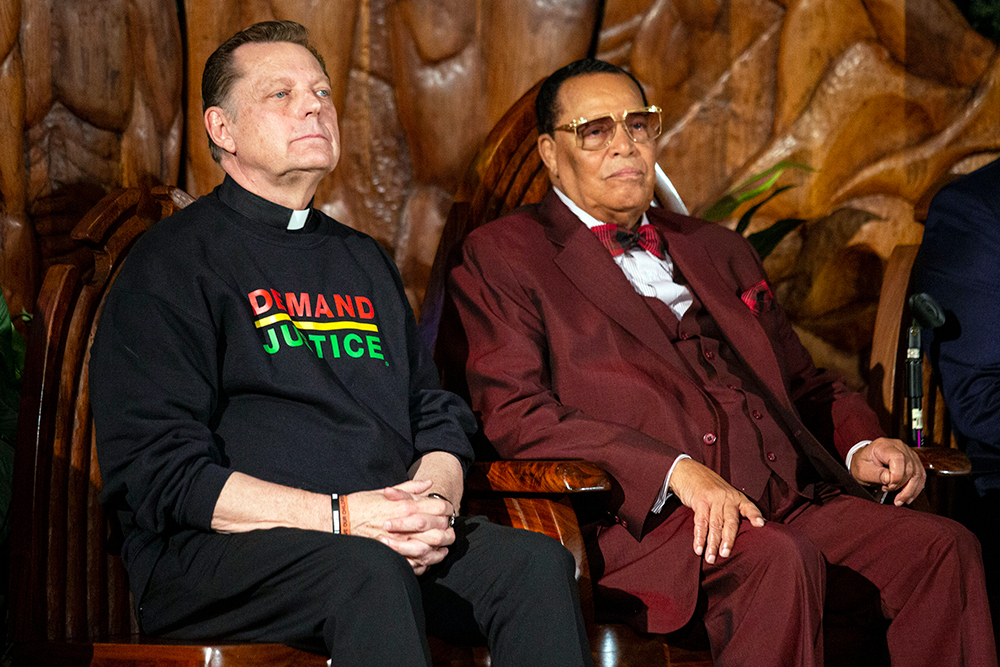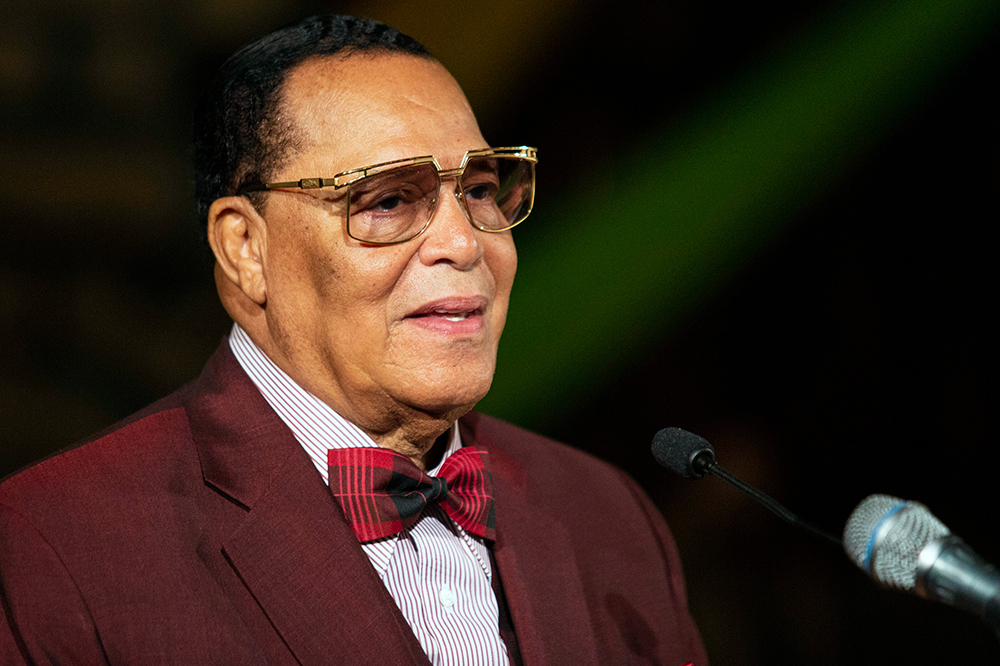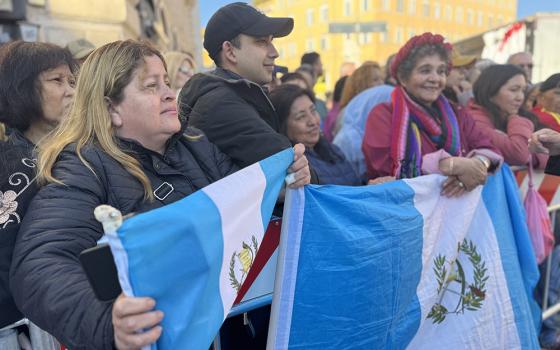
Fr. Michael Pfleger, left, sits next to Minister Louis Farrakhan, of the Nation of Islam, before they both speak at St. Sabina Church on May 9 in Chicago. (Ashlee Rezin/Chicago Sun-Times via AP)
Louis Farrakhan's appearance at a high-profile Chicago Catholic church resulted in condemnations by Jewish leaders and by Chicago Cardinal Blase Cupich for the Nation of Islam leader's past anti-Semitic comments, "outright slander" and hate speech.
But in his wide-ranging, hour-long speech, Farrakhan painted himself as a victim of hate by those who oppose him.
"I am a hated man today," he told the parishioners and visitors who crowded St. Sabina Parish the evening of May 9. "The enemy is so hateful of me."
Farrakhan said his detractors had made him a "litmus test," causing those who have been photographed with him — including the late Chicago Cardinal Francis George — to ask that the pictures not be released publicly. He said George joined him for dinner in his home and that he had also met with the late Cardinal Joseph Bernardin in his office.
Among those who have called Farrakhan an extremist for making anti-Semitic, anti-white and anti-LGBT comments are the Anti-Defamation League and the Southern Poverty Law Center.
The 86-year-old Farrakhan grew up Episcopalian and joined the Nation of Islam in 1955. He has led the organization since 1978, after former leader Elijah Muhammad's son made substantial changes after his father's death and renamed that group.
At St. Sabina's, Farrakhan said he believes God has called him to reveal those who are "followers of Satan," including governments that require a license for preaching, Southern Baptists who do not allow women in the sanctuary and some Jewish people because of what he termed "hatred of Jesus in the Talmud," the central text in rabbinical Judaism.
But he noted that Jews are divided today "because of Satan's intervention," adding that he was "here to separate the good Jews from the Satanic Jews."
He also criticized Christian churches for their divisions ("Everybody that knows a few verses of the Bible starts a church"), the founding fathers who owned slaves, government officials who "poisoned the water" in Flint, Michigan, and the administration that started the war in Iraq based on false statements about weapons of mass destruction.
Advertisement
And he blasted Facebook, which announced last week it was banning Farrakhan and several other users it deemed "dangerous."
But on that point, Farrakhan agreed. "I am really dangerous," he said, adding that it was God who "made me dangerous to Satan."
But Farrakhan defended his use of the social media platform, saying he used it "with respect."
"I have not said one word of hate. I do not hate Jewish people. Not one that is with me has ever committed a crime against the Jewish people, black people, white people, no matter what your color is," he said, adding that he was also not a misogynist or a homophobe.
"Don't be angry with me if I stand up on God's word," he said.
St. Sabina's pastor, Fr. Michael Pfleger, called Farrakhan "a friend" and "a fighter for justice, equality and freedom," and said he offered his pulpit to his "brother" in defense of free speech after hearing about Facebook's ban, which he termed "unjust."
Farrakhan said the two have been friends for nearly 40 years and he has spoken several times at the parish, which is about four miles from the Nation of Islam's Mosque Maryam.
"Minster Farrakhan has been a bold voice against injustice done against black people in this country, and his voice deserve and needs to be heard," Pfleger said in his introduction.
"Many say they do not like Minister Farrakhan because all they have heard is various soundbites," Pfleger said, praising the Nation of Islam for "raising up strong, clean, nonviolent black men" and "saving lives."
Attempts to reach Pfleger for comment were unsuccessful at the time of publication.
But, at a news conference before Farrakhan's speech, officials at the Illinois Holocaust Museum officials criticized Pfleger for "giving hatred a platform." Museum CEO Susan Abrams publicly invited Pfleger and Farrakhan to tour the museum and to meet with her and museum president Fritzie Fritzshall, a survivor of the Auschwitz concentration camp.
The archdiocese's director of violence prevention, Phil Andrew, also attended the museum's news conference, the Chicago Tribune reported.

Minister Louis Farrakhan, of the Nation of Islam, speaks at St. Sabina Church on May 9 in Chicago. (Ashlee Rezin/Chicago Sun-Times via AP)
In his statement the next day, Cupich apologized to "my Jewish brothers and sisters, whose friendship I treasure, from whom I learn so much, and whose covenant with God remains eternal."
Cupich said he was not consulted about Farrakhan's appearance and was disappointed that the Nation of Islam leader did not "deliver a unifying message of God's love for all his children."
"Instead, he repeatedly smeared the Jewish people, using a combination of thinly veiled discriminatory rhetoric and outright slander," the Chicago cardinal said in his statement.
"Antisemitic rhetoric — discriminatory invective of any kind — has no place in American public life, let alone in a Catholic church," Cupich said.
Rabbi Yehiel Poupko of the Jewish Federation of Metropolitan Chicago told NCR that Cupich's "thoughtful and loving affirmation" is an example of the church's "faithfulness to its promise" of friendship and respect to the Jewish people and Judaism, as described in the Second Vatican Council document Nostra Aetate.
"Catholics and Jews are each taught 'Do not stand idly by' in the face of evil," Poupko said. "The cardinal didn't. He stood by his beloved church's teachings and stood for, and with, us, his Jewish brothers and sisters."
[Heidi Schlumpf is NCR national correspondent. Her email address is hschlumpf@ncronline.org. Follow her on Twitter @HeidiSchlumpf.]






